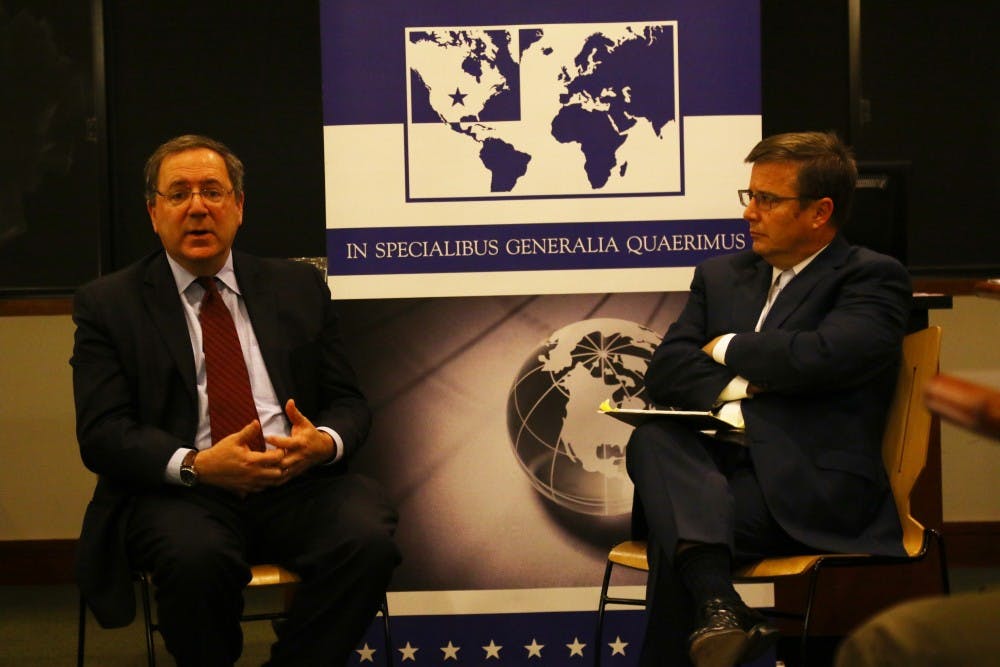David Sanger, chief Washington correspondent for The New York Times, touched upon cyberwarfare, the Iran nuclear deal and President Barack Obama's foreign policy at a discussion titled “An Obama Scorecard: Cyber, Nuclear Proliferation and Geopolitical Instability” Thursday night at the Sanford School of Public Policy.
The event was sponsored by the Triangle’s Institute for Security Studies, the political science department, the DeWitt Wallace Center for Media & Democracy, and the Duke University Program in American Grand Strategy. Peter Feaver, professor of political science and public policy, started off the event by asking about the nuclear deal with Iran, which Sanger had originally predicted would fail. Sanger joked that perhaps his denial was part of why the deal in fact succeeded, and continued by noting that multiple factors—including isolation and sanctions—brought Iran to the negotiating table.
“Whenever you have to make a final decision on whether to take a deal like this, the question always comes down to ‘compared to what?’” Sanger said. “I don’t think this was a hard decision.”
Sanger, who has twice reported as a part of Pulitzer Prize-winning teams, noted that Obama's foreign policy strategy regarding Iran has made it clear that any threat of violence is unfounded. That was one reason why, he said, the U.S. began implementing more creative methods to counteract Iran, including cyberwarfare. One such program, Operation Olympic Games, started under former President George W. Bush and targeted Iranian nuclear facilities.
Continuing on the subject of cyberwarfare, Sanger explained that the nature of and retaliations against cyberwar are quite different than those of conventional warfare. Referring to the 2014 cyberattack on Sony allegedly carried out by North Korea, he stated that if a physical attack had been made against a building, there would have been national outrage.
“If [North Korea] had done this the old fashioned way... there would have been a lot of calls in the United States for us to go do something pretty nasty to the North Koreans," Sanger said. "But if you do it with a cyberweapon where it’s unclear whether it was really done by the North Koreans or done by a couple kids sitting in a basement, [it’s handled differently].”
Toward the end of the discussion, Feaver shifted the conversation toward the legacy of Obama’s foreign policy in the Middle East. Describing the situation in Syria, Sanger said that Obama probably should have done more to prevent civil war.
“Sometimes there are errors of omission as much as there is commission," Sanger said. "The pendulum may have swung too far in the case of Syria. President Obama absolutely determined not to get us involved in another Middle East war that we can’t extract ourselves from. [He was] so focused… that he didn’t put enough creativity into what could have slowed or stopped the war.”
A mix of community members and undergraduate students attended the discussion. Senior James Lauria, a member of AGS, thought that hearing from Sanger was a unique experience.
“I haven’t been to many talks from news reporters here, [it’s been] mostly people who have been in government," Lauria said. "And so he’s not necessarily an outsider to it, but he definitely has a new perspective.”
Lauria continued by saying that these sorts of discussions could be good for the campus climate, but that more students from all areas of study should show up.
“Unfortunately, I think the problem we have with it is that the people who go to the talks are the same people who are naturally involved in these sort of things, so it kind of fits an echo chamber role," he said. "It’d be better if we could somehow advertise this to students in other disciplines.”
Get The Chronicle straight to your inbox
Signup for our weekly newsletter. Cancel at any time.

